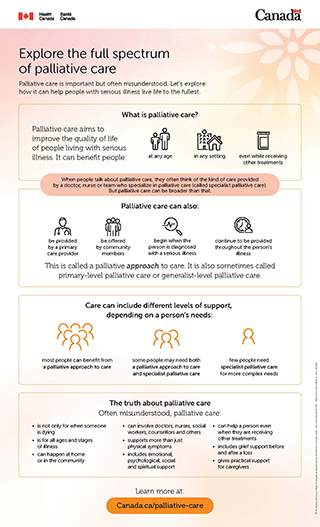Explore the full spectrum of palliative care
Download in PDF format
(1.56 MB, 1 page)
- Organization: Health Canada
- Date published: 2025-11-14
Palliative care is important but often misunderstood. Let's explore how it can help people with serious illness live life to the fullest.
What is palliative care?
Palliative care aims to improve the quality of life of people living with serious illness. It can benefit people:
- at any age
- in any setting
- even while receiving other treatments
When people talk about palliative care, they often think of the kind of care provided by a doctor, nurse or team who specialize in palliative care (called specialist palliative care). But palliative care can be broader than that.
Palliative care can also:
- be provided by a primary care provider
- be offered by community members
- begin when the person is diagnosed with a serious illness
- continue to be provided throughout the person's illness
This is called a palliative approach to care. It is also sometimes called primary-level palliative care or generalist-level palliative care.
Care can include different levels of support, depending on a person's needs:
- most people can benefit from a palliative approach to care
- some people may need both a palliative approach to care and specialist palliative care
- few people need specialist palliative care for more complex needs
The truth about palliative care
Often misunderstood, palliative care:
- is not only for when someone is dying
- is for all ages and stages of illness
- can happen at home or in the community
- can involve doctors, nurses, social workers, counsellors and others
- supports more than just physical symptoms
- includes emotional, psychological, social and spiritual support
- can help a person even when they are receiving other treatments
- includes grief support before and after a loss
- gives practical support for caregivers
Learn more at: Canada.ca/palliative-care
